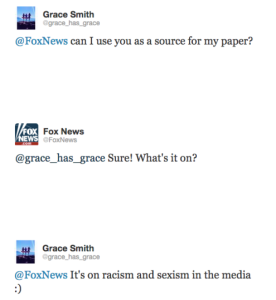When you first hear the words ‘media research’, they don’t really go together. What reliable research goes into a TMZ article?! But in actual fact, researching the media is of utmost importance to understand patterns and find credibility in the many mediums of the media. Media research is happening everyday; it can inform our personal decisions and influence our choices (McCutcheon, 2015).
However, there is a great difference between everyday research, the research we undertake in our day-to-day lives, and scholarly research, the systematic, credible and objective investigation of media patterns (McCutcheon 2015). Everyday research can be flawed and selective as it is much too casual, and does not contain authoritative, nor academic backing, whilst scholarly research is very concerned with being correct, truthful and concise (McCutcheon 2015). The perfect research for media figures, journalists and commentators in order to remain trustworthy and authentic to the audience is the use of this scholarly research.
Research is often undertaken when an issue or object, is the talk of social circles. For example, ‘The Dress’. The phenomenon that broke the Internet recently divided so many; we were bombarded with an onslaught of images of the dress, that people, public and scientific researchers alike, took it upon themselves to find a feasible scientific explanation.
This is similar to that of social issues that plague everyday talks, and propels the desire to research these aspects and garner informed views.
However, when many people have the ability to contribute to these conversations, it is hard to decipher what is true and can be believed. This is why I would like to research the impact that social medias have in social justice issues such as the horrific cases of violence, brutality, and race inequality and unrest that have occurred in Ferguson during 2014. The difficulty in the reporting of the situation made audiences like us unsure of what was actually occurring, for example, we received different stories on social medias like Tumblr than what was reported on mainstream news. I would like to question what kind of effect that social media has on social justices, as well as media commenting.
Social media in its entirety is such a large part of how society interacts now, so in addition to this social justice issue, it would also be interesting to look into whether social media and social interactive sites have lost ethical value, for example, is social media invading our personal privacy, or the privacy of victims?
Image source: tumblr user graceless-grace
Another aspect of media that I feel is in desperate need of attention by researchers is gender inequality and feminism in the media. Why is this still occurring? Why is it that Sam Smith gets applauded for writing songs about his ex, while Taylor Swift gets derided? Why is the biggest question that Taylor Swift gets asked at the Grammys is if she will take a man home with her? Many particular cases this year have assisted in helping this issue come to light, especially during the Hollywood awards circuit of all places. The hashtag #askhermore became a cause to work for, and allow women in the acting and directing industry to answer questions about their work, rather than simply being asked, “who are you wearing?” (Vultaggio 2015). These are the issues that I see fit to research with genuine interest.
References:
McCutcheon, M 2015, ‘What is Media Research?’, lecture notes, BCM210, University of Wollongong, viewed 11 March 2015.
Vultaggio, M 2015, ‘Ask Her More on 2015 Oscars Red Carpet: Reese Witherspoon, Lupita Nyong’o and Julianne Moore Participate’, International Business Times, 22 February, viewed 23 March, <http://www.ibtimes.com/ask-her-more-2015-oscars-red-carpet-reese-witherspoon-lupita-nyongo-julianne-moore-1824386>.
